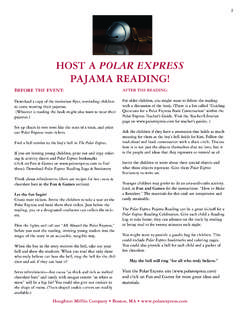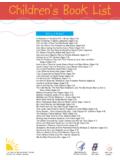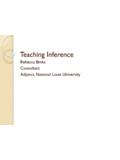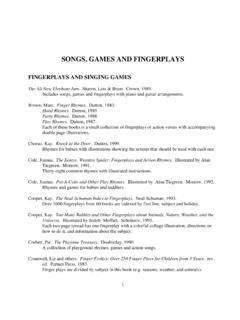Transcription of Basic Grammar - esl-law.com
1 2010 Christian Schrade Basic Grammar . Christian Schrade, attorney-at-law TESOL, College of Teachers 1. 2010 Christian Schrade BIBLIOGRAPHY. American Heritage Children's Dictionary 2010 Houghton Mifflin Company Basic Grammar in Use, Murphy/Smalzer 2002 Cambridge University Press Practical English Usage, 3rd edition 2005 Michael Swan CONTENTS. Pronouns I, Me, My, Mine, Myself Page 03. Article/Plurals Page 04. Number v. Amount - Much, Many, Little, Few, Some, Any Page 05. Comparison - Comperative/Superlative Page 06.
2 Present - Simple/Progressive Page 07. Past - Simple/Progressive Page 08. Post-Present/Future - Simple/Progressive Page 09. Questions Page 10. Passive Voice - Past, Present, Post-Present, Future Page 11. Modals - Degrees of Certainty; Permission, Prohibition, Obligation Page 12. Collocations - Word Combinations, Idioms, Phrasal Verbs Page 13. 2. 2010 Christian Schrade PRONOUNS I, ME, MY, MINE, MYSELF. PERSONAL. Subject People Object I I know Jim and he knows me. me you You know Jim and he knows you. you he/she He/She knows Jim and he knows him/her.
3 Him/her we We know Jim and he knows us. us they They know Jim and he knows them. them it/they Things it/them POSSESSIVE. They tell us who owns something. To own means to have and keep something: Jim owns a lot of books. Bob is owner of a restaurant. To possess also means to own or have something: Everything that I possess is in my bedroom. I my mine It's my money. It's mine. you your yours It's your money. It's yours. he/she his/her his/hers It's his/her money. It's his/hers. it its NYC is famous for its skyscrapers.
4 We our ours It's our money. It's ours. they their theirs It's their money. It's theirs. REFLEXIVE. They tell us that subject (I/we/etc.) and object (me/us/etc.) are the same person. I me myself I cut myself. you you yourself I love you for yourself. he him himself He looked at himself in the mirror. she her herself She talks to herself sometimes. it it itself The bag itself is nice but small. we us ourselves We enjoyed ourselves. you (Pl.) you yourselves Please help yourselves. they them themselves They paid for themselves.
5 3. 2010 Christian Schrade ARTICLE - A, AN, THE. a, an the Can you give me a pen? Can you give me the pen? . a pen = any pen the pen = the one in your hand A/an means one out of many: Red is a color (there are many colors). The tells us which one: The red of your shirt is nice (only this red). Use an before a/e/i/o/u: Ease of pronunciation*. * pronunciation - how you speak the sound of words; to pronounce (v.); pronunciation (n.). a an a banana an apple a hat an umbrella a boring TV program an interesting TV program a university (pronounced: yuniversity) an hour (h is not pronounced = silent).
6 PLURALS - FLOWER/S, BUS/ES. The plural of a noun is usually: noun + s/es a week two weeks a box many boxes Some plurals are irregular: man men foot feet sheep sheep woman women tooth teeth fish fish child children mouse mice person people 4. 2010 Christian Schrade NUMBER v. AMOUNT.. none a little/a few some much/many all None of the square is black. A little/Some/Much of the square is black. All of the square is black. MUCH, MANY. Much means a lot, a great quantity or amount: There's not much food in the icebox.
7 Many means a large number: There are many different colors. much + uncountable noun* many + countable noun**. much money/food/time many books/people/days * Uncountable noun: We see them as masses and not as separate objects. ** Countable noun: We can use numbers and the article a/an; they have plurals. LITTLE, FEW. A little means a small amount or quantity: Sue drank only a little of her milk. A few means a small number, not many: There are only a few apples on the tree. a little + uncountable noun a few + countable noun a little money/food/time a few books/people/days SOME, ANY.
8 Some means a number or quantity that is not known: Brenda didn't read all her books. She read only some of them. Any means that it does not matter which one: Take any seat you like. limited unlimited I like some pop music. I like any pop music. I don't like some pop music. I don't like any pop music. Is there someone here on Saturday? Is there anyone here on Saturday? 5. 2010 Christian Schrade COMPARISON. adjective + -er/-est;. more/most + adjective Adjective Comperative Superlative 1 syllables: old, fat, late older, fatter, later oldest, fattest, latest 2 syllables: po lite politer/more polite politest/most polite 3 syllables: beau ti ful more beautiful most beautiful EXAMPLES.
9 Take a seat! couch chair/seat floor is the biggest. A couch is the most comfortable to sit in. is bigger than , , and . A couch is more comfortable than a chair. , , and are not as big as . A seat is not as comfortable as a couch. , , and are not so big as . A seat is not so comfortable as a couch. is as big as . ( is so big as ) A chair is as comfortable as a seat. and are bigger than . A seat is more comfortable than the floor. is the smallest. The floor is the least comfortable to sit on. IRREGULAR.
10 Adjective Comperative Superlative good better best bad worse worst much/many more most little less least few fewer/less fewest/least far farther/further* farthest/furthest * I can throw a ball farther than you (= distance). Wait for further instructions (= more instructions). 6. 2010 Christian Schrade PRESENT. sketches present simple present progressive (cf. past progressive). Jim plays soccer, but he doesn't play very well. Does he play soccer? Yes, he does. Jim is playing computer games now, but he isn't playing very well.








